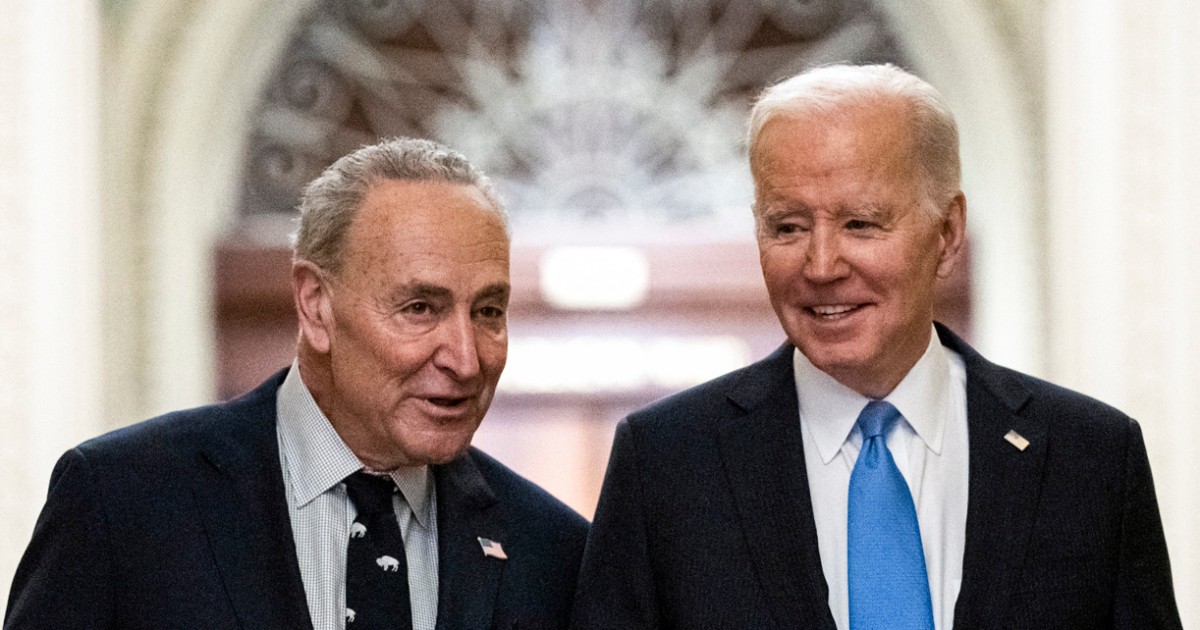WASHINGTON — The Senate voted Thursday night to approve a bill that would extend the debt ceiling by two years and establish a two-year budget deal with a broad bipartisan vote.
The vote was 63-36.
Having already passed the House on Wednesday, it now goes to President Joe Biden, who is expected to sign it off and avoid an economically catastrophic debt default with just days before the Monday deadline.
The deal was brokered by Biden, a Democrat, and House Speaker Kevin McCarthy, a Republican, after a long stalemate and a hectic few weeks of negotiations as the United States edged over the precipice. Biden will address the nation on the bill at 7 p.m. ET on Friday.
«America can breathe a sigh of relief. Because in this process we are avoiding default,» said Senate Majority Leader Chuck Schumer, DN.Y. «The consequences of non-compliance would be catastrophic.»
Senate Minority Leader Mitch McConnell, R-Ky., defended the bill as «an urgent and important step in the right direction — for the health of our economy and the future of our country.»
The final Senate vote came after 11 amendments were considered, a demand from several senators in exchange for agreeing to vote on the bill quickly; all amendments were struck down. That deal allowed the Senate to bypass a series of hurdles that, without unanimous consent, could have pushed the US past its debt-ceiling deadline on Monday. The senators also wanted to get out of town for a long weekend, speeding up procedural talks.
The extension of the debt ceiling does not authorize new expenses; it allows the US to pay off existing debts that both sides have accumulated over many years through demands for higher spending on national and military programs, as well as lower taxes.
Once signed into law, the bill will limit spending for the next two years with a modest cut in non-military spending and a modest expansion in defense spending. It includes conservative measures to recover about $28 billion in unspent Covid relief funds, eliminate $1.4 billion in IRS funds, and overhaul the permitting process for energy projects.
The bill will restart federal student loan payments after a long «pause» that began early in the pandemic. And it would impose work requirements for people up to age 55 to obtain benefits under the Supplemental Nutrition Assistance Program, or SNAP, and Temporary Assistance for Needy Families, or TANF; Currently, there are work requirements for beneficiaries up to age 50. The SNAP and TANF changes include exceptions for veterans, the homeless, and adults up to age 24 who are out of foster care.
The Biden-McCarthy deal would not make any changes to Social Security, Medicare or Medicaid.
Schumer celebrated the bill as a Democratic victory Thursday night, noting that more Democrats supported the bill than Republicans in both chambers.
«I thank my colleagues for a good job tonight,» Schumer said. “I commend President Biden and his team for reaching a sensible compromise under the most difficult of circumstances. Many of the destructive provisions of the Republican bill have disappeared.»
McConnell praised McCarthy in a statement for acting first and passing a bill that «avoids the catastrophic consequences of default and begins to curb Washington Democrats’ addiction to reckless spending that adds to our nation’s debt.»
Liz Brown-Kaiser and kate santaliz contributed.




